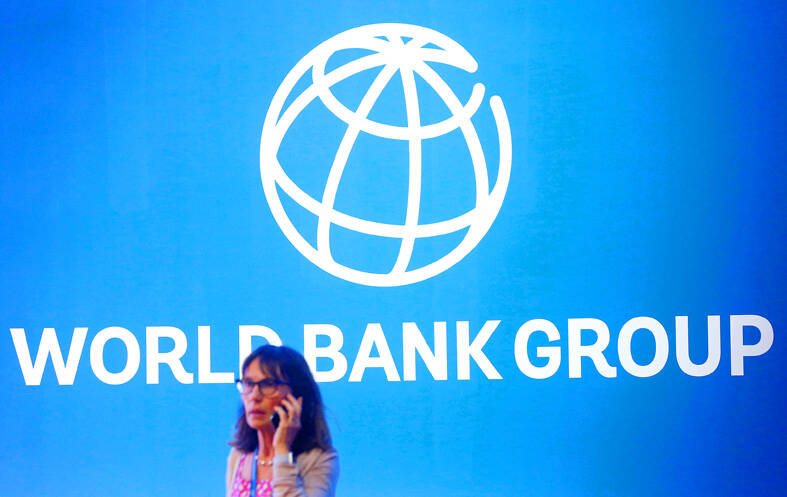Asian economies are not doing as well as they could and growth in the region is forecast to slow to 4.5 percent this year from 5.1 percent last year, the World Bank said in a report yesterday.
Debt, trade barriers and policy uncertainties are dulling the region’s economic dynamism and governments need to do more to address long-term problems such as weak social safety nets and underinvestment in education, the report said.
Asia’s economies are growing more slowly than before the COVID-19 pandemic, but faster than other parts of the world. And a rebound in global trade — trade in goods and services grew by only 0.2 percent last year but is projected to grow by 2.3 percent this year — and easing financial conditions as central banks cut interest rates will help offset weaker growth in China.

Photo: Reuters
“This report demonstrates the region is outperforming much of the rest of the world, but it’s underachieving its own potential,” World Bank chief economist for East Asia and the Pacific Aaditya Mattoo said in an online briefing.
“The leading firms in the region are not playing the … role that they should,” he added.
A key risk is that the US Federal Reserve and other major central banks might keep interest rates higher than before the pandemic. Another comes from the nearly 3,000 trade-distorting measures, such as higher tariffs or subsidies, that were imposed last year, the report said.
Most of those policies were set by major industrial economies such as the US, China and India.
China’s ruling Chinese Communist Party has set an official target for about 5 percent growth this year, just below the 5.2 percent annual pace of last year.
The World Bank is forecasting that growth will slow to 4.5 percent.
“China is aiming to transition to a more balanced growth path but the quest to ignite alternative demand drivers is proving difficult,” the report said.
Mattoo said Beijing still has a way to go in shifting its economy away from reliance on real estate construction to drive business activity, and just spending more money won’t fix the problem.
“The challenge for China is to choose efficient policies,” he said. “Fiscal stimulus will not fix structural imbalances,” he said. What is needed are stronger social welfare and other programs that will enable households to spend more, boosting demand that will then encourage businesses to invest.
The region could be doing much better with improved productivity and greater efficiency, Mattoo said.
Vietnam, for example, is drawing huge amounts of foreign investment as a favored destination for foreign manufacturers, but its growth rate of about 5 percent is below its potential.
“To be happy that Vietnam is growing at 5 percent reflects the kind of underachievement we should not be happy about,” Mattoo said.
One key problem highlighted in the report is lagging improvements in productivity, the report said. Leading companies in Asia are far behind the leaders in wealthier nations, especially in technology-related areas.
The report faults governments for imposing restrictions on investment that prevent foreign companies from entering key parts of regional economies, a need to build skills and weak management. Opening to more competition and investing more in education would help, it said.

Taiwanese suppliers to Taiwan Semiconductor Manufacturing Co. (TSMC, 台積電) are expected to follow the contract chipmaker’s step to invest in the US, but their relocation may be seven to eight years away, Minister of Economic Affairs J.W. Kuo (郭智輝) said yesterday. When asked by opposition Chinese Nationalist Party (KMT) Legislator Niu Hsu-ting (牛煦庭) in the legislature about growing concerns that TSMC’s huge investments in the US will prompt its suppliers to follow suit, Kuo said based on the chipmaker’s current limited production volume, it is unlikely to lead its supply chain to go there for now. “Unless TSMC completes its planned six

Intel Corp has named Tasha Chuang (莊蓓瑜) to lead Intel Taiwan in a bid to reinforce relations between the company and its Taiwanese partners. The appointment of Chuang as general manager for Intel Taiwan takes effect on Thursday, the firm said in a statement yesterday. Chuang is to lead her team in Taiwan to pursue product development and sales growth in an effort to reinforce the company’s ties with its partners and clients, Intel said. Chuang was previously in charge of managing Intel’s ties with leading Taiwanese PC brand Asustek Computer Inc (華碩), which included helping Asustek strengthen its global businesses, the company

Power supply and electronic components maker Delta Electronics Inc (台達電) yesterday said second-quarter revenue is expected to surpass the first quarter, which rose 30 percent year-on-year to NT$118.92 billion (US$3.71 billion). Revenue this quarter is likely to grow, as US clients have front-loaded orders ahead of US President Donald Trump’s planned tariffs on Taiwanese goods, Delta chairman Ping Cheng (鄭平) said at an earnings conference in Taipei, referring to the 90-day pause in tariff implementation Trump announced on April 9. While situations in the third and fourth quarters remain unclear, “We will not halt our long-term deployments and do not plan to

TikTok abounds with viral videos accusing prestigious brands of secretly manufacturing luxury goods in China so they can be sold at cut prices. However, while these “revelations” are spurious, behind them lurks a well-oiled machine for selling counterfeit goods that is making the most of the confusion surrounding trade tariffs. Chinese content creators who portray themselves as workers or subcontractors in the luxury goods business claim that Beijing has lifted confidentiality clauses on local subcontractors as a way to respond to the huge hike in customs duties imposed on China by US President Donald Trump. They say this Chinese decision, of which Agence